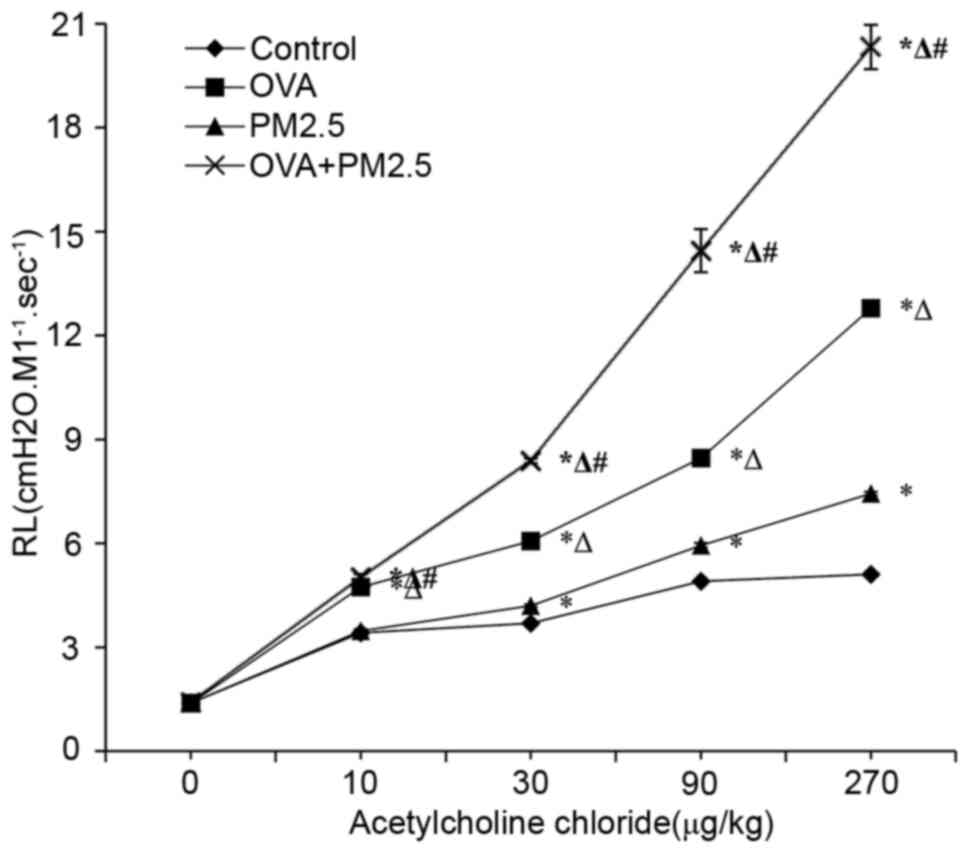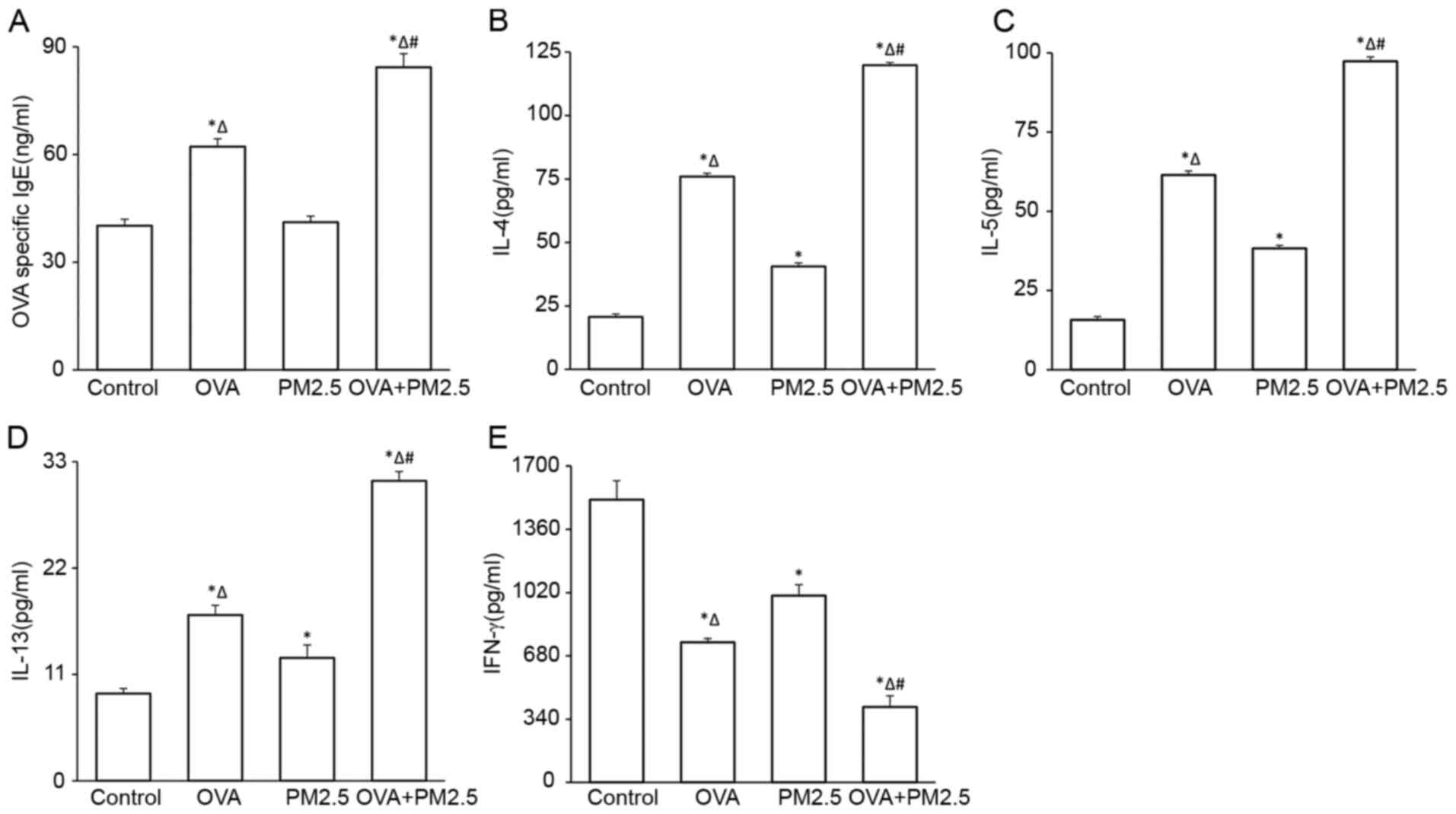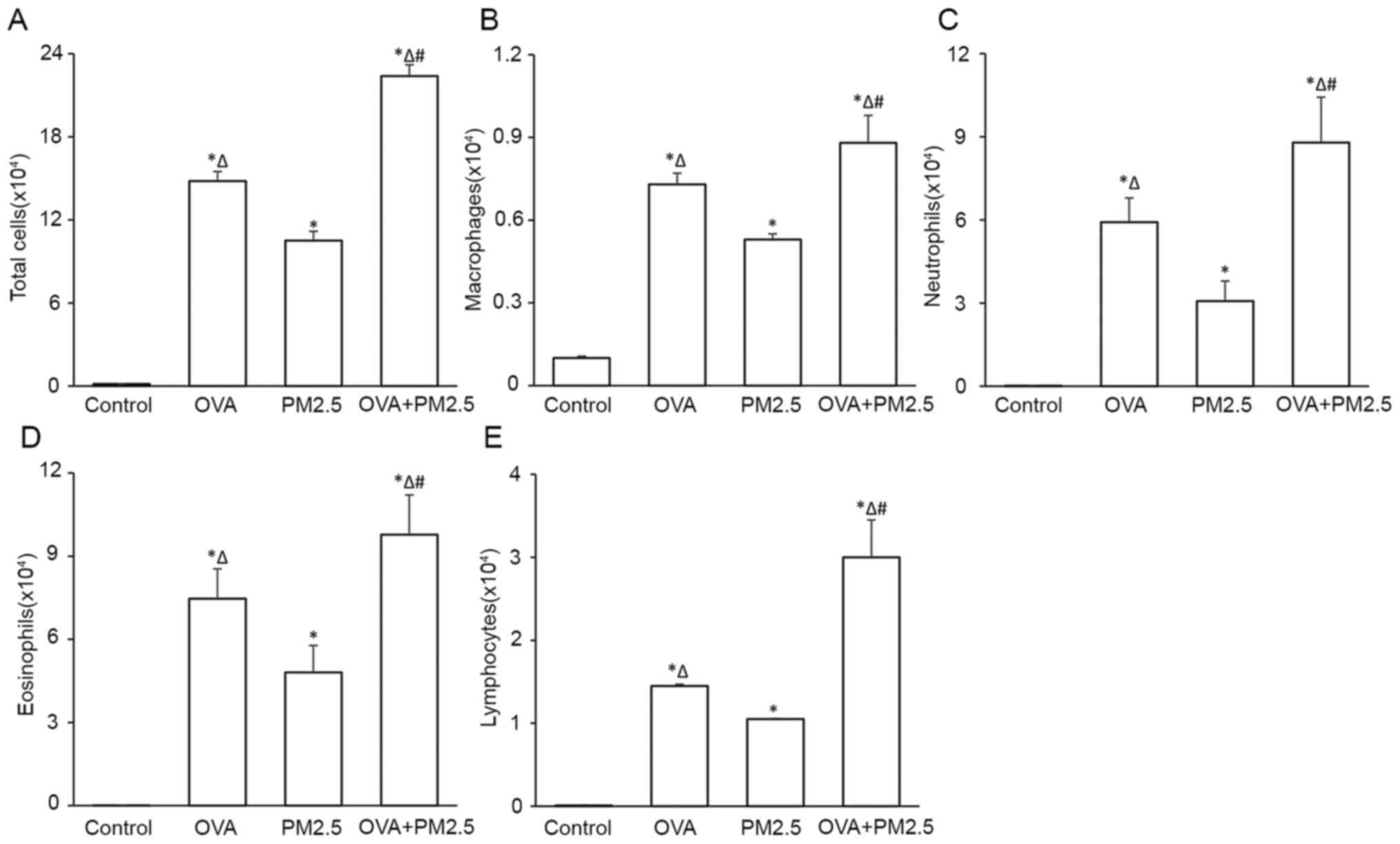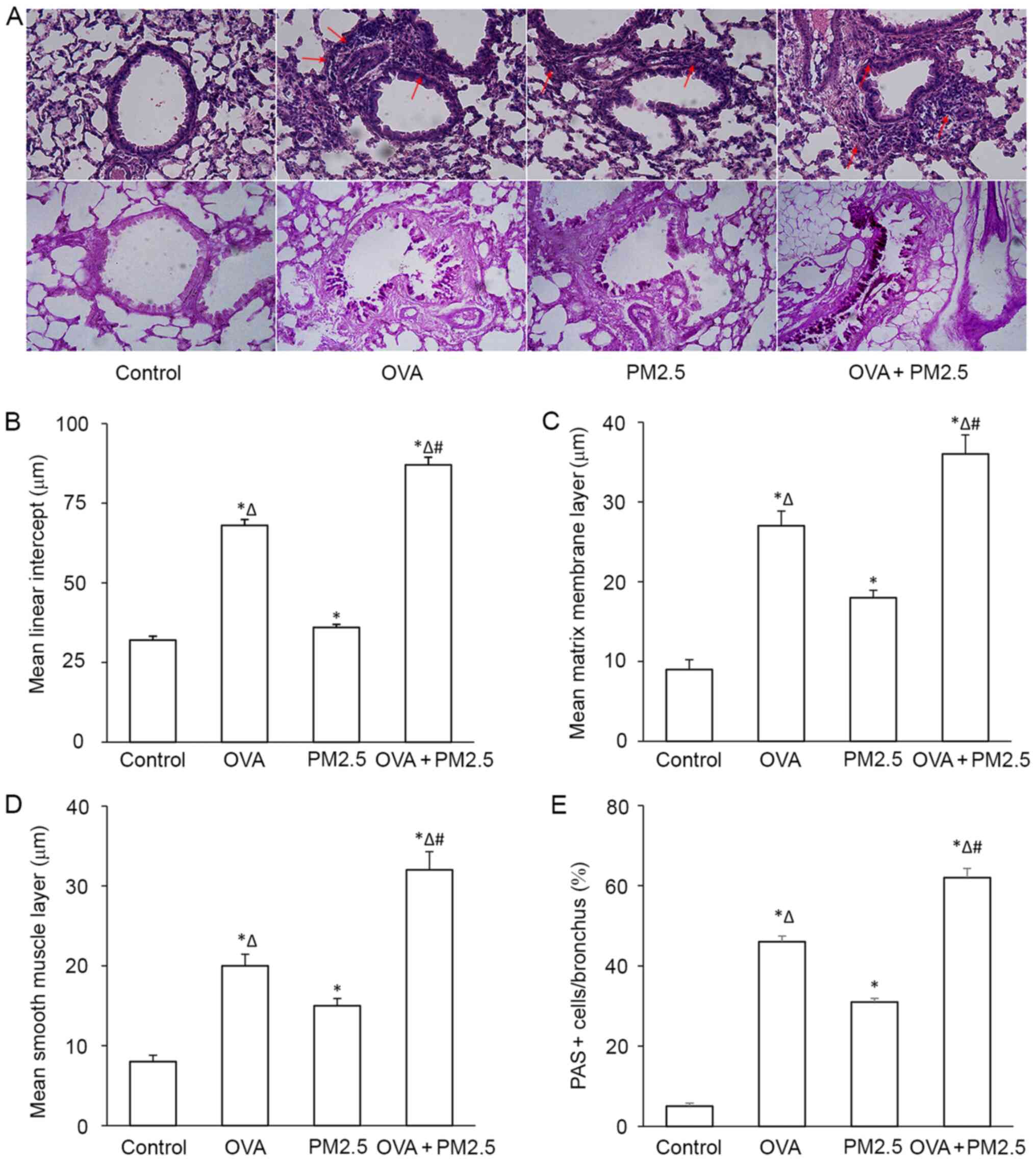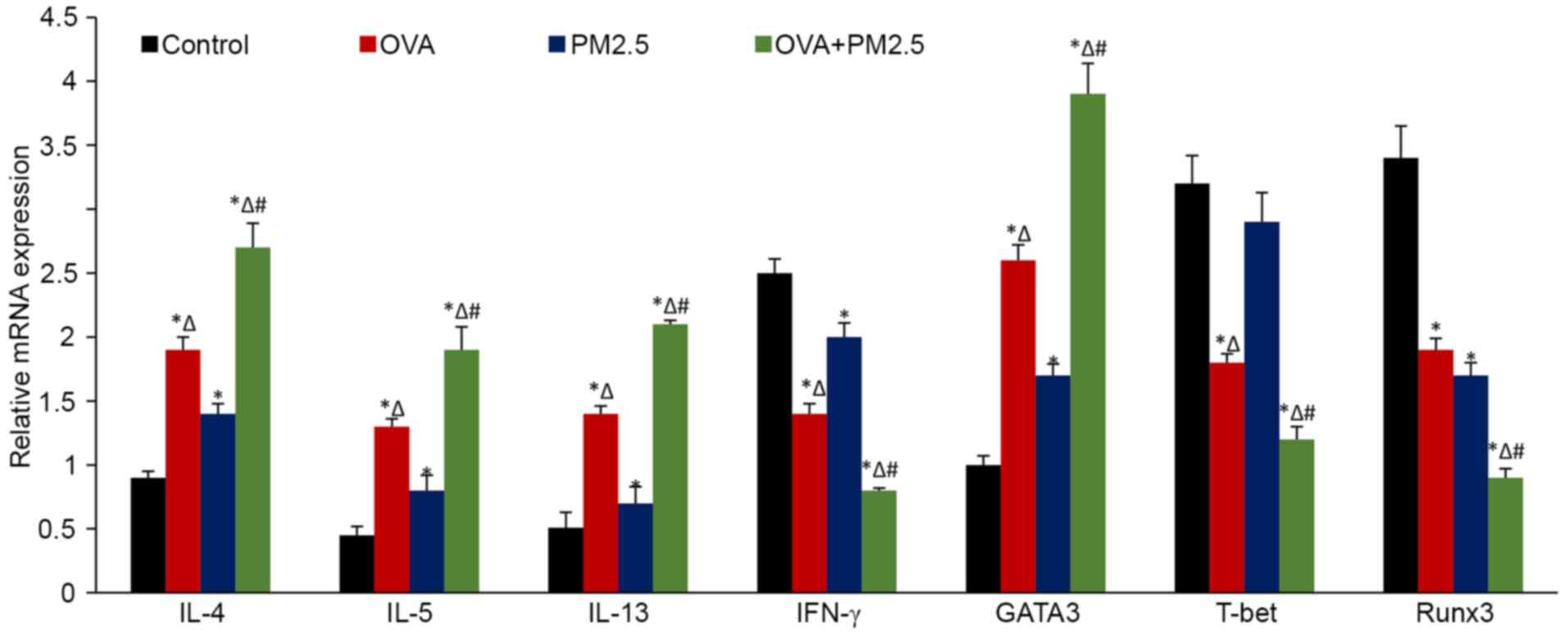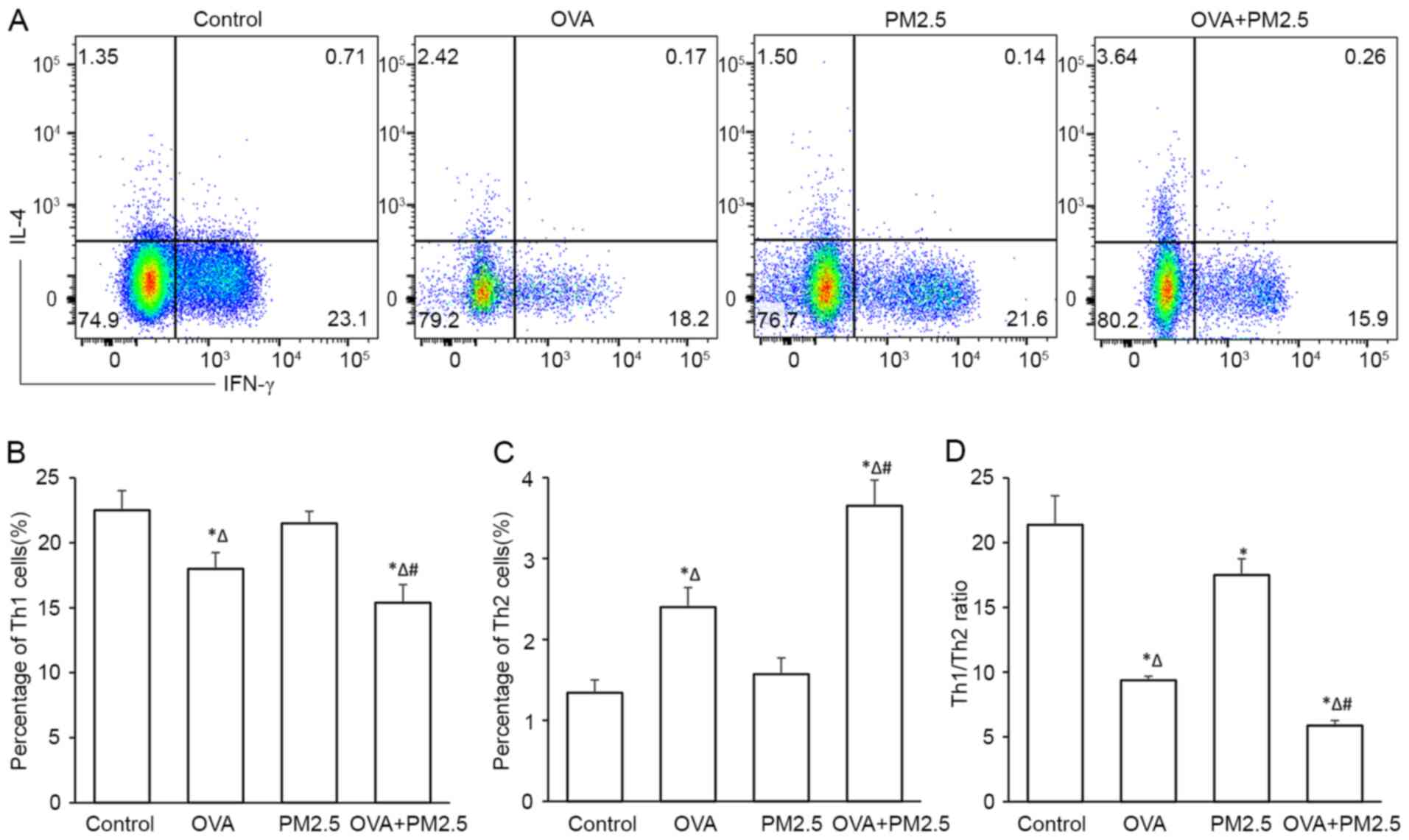|
1
|
Global Initiative for Asthma (GINA), .
GINA Global strategy for asthma management and prevention. GINA;
Fontana, WI: 2019, www.ginasthma.org
|
|
2
|
GBD 2016 Disease and Injury Incidence and
Prevalence Collaborators, . Global, regional, and national
incidence, prevalence, and years lived with disability for 328
diseases and injuries for 195 countries, 1990–2016: A systematic
analysis for the Global Burden of Disease Study 2016. Lancet.
390:1211–1259. 2017. View Article : Google Scholar : PubMed/NCBI
|
|
3
|
Holgate ST: Innate and adaptive immune
responses in asthma. Nat Med. 18:673–683. 2012. View Article : Google Scholar : PubMed/NCBI
|
|
4
|
Hogg JC: The pathology of asthma. APMIS.
105:735–745. 1997. View Article : Google Scholar : PubMed/NCBI
|
|
5
|
Walsh GM: Anti-IL-4/-13 based therapy in
asthma. Expert Opin Emerg Drug. 20:349–352. 2015. View Article : Google Scholar
|
|
6
|
Arima M and Fukuda T: Prostaglandin
D2 and T(H)2 inflammation in the pathogenesis
of bronchial asthma. Korean J Intern Med. 26:8–18. 2011. View Article : Google Scholar : PubMed/NCBI
|
|
7
|
Zhu J, Yamane H and Paul WE:
Differentiation of effector CD4 T cell populations. Annu Rev
Immunol. 28:445–489. 2012. View Article : Google Scholar
|
|
8
|
Ho IC, Tai TS and Pai SY: GATA3 and the
T-cell lineage: Essential functions before and after
T-helper-2-cell differentiation. Nat Rev Immunol. 9:125–135. 2010.
View Article : Google Scholar
|
|
9
|
Koh BH, Hwang SS, Kim JY, Lee W, Kang MJ,
Lee CG, Park JW, Flavell RA and Lee GR: Th2 LCR is essential for
regulation of Th2 cytokine genes and for pathogenesis of allergic
asthma. Proc Natl Acad Sci U S A. 23:10614–10619. 2010. View Article : Google Scholar
|
|
10
|
Lighvani AA, Frucht DM, Jankovic D, Yamane
H, Aliberti J, Hissong BD, Nguyen BV, Gadina M, Sher A, Paul WE and
O'Shea JJ: T-bet is rapidly induced by interferon-gamma in lymphoid
and myeloid cells. Proc Natl Acad Sci U S A. 98:15137–15142. 2001.
View Article : Google Scholar : PubMed/NCBI
|
|
11
|
Voon DC, Hor YT and Ito Y: The RUNX
complex: Reaching beyond haematopoiesis into immunity. Immunology.
146:523–536. 2015. View Article : Google Scholar : PubMed/NCBI
|
|
12
|
Shan Q, Zeng Z, Xing S, Li F, Hartwig SM,
Gullicksrud JA, Kurup SP, Van Braeckel-Budimir N, Su Y, Martin MD,
et al: The transcription factor Runx3 guards cytotoxic
CD8+ effector T cells against deviation towards
follicular helper cell lineage. Nat immunol. 18:931–939. 2017.
View Article : Google Scholar : PubMed/NCBI
|
|
13
|
Cruz-Guilloty F, Pipkin ME, Djuretic IM,
Levanon D, Lotem J, Lichtenheld MG, Groner Y and Rao A: Runx3 and
T-box proteins cooperate to establish the transcriptional program
of effector CTLs. J Exp Med. 206:51–59. 2009. View Article : Google Scholar : PubMed/NCBI
|
|
14
|
Naoe Y, Setoguchi R, Akiyama K, Muroi S,
Kuroda M, Hatam F, Littman DR and Taniuchi I: Repression of
interleukin-4 in T helper type 1 cells by Runx/Cbf beta binding to
the Il4 silencer. J Exp Med. 204:1749–1755. 2007. View Article : Google Scholar : PubMed/NCBI
|
|
15
|
Estécio MR, Maddipoti S, Bueso-Ramos C,
DiNardo CD, Yang H, Wei Y, Kondo K, Fang Z, Stevenson W, Chang KS,
et al: RUNX3 promoter hypermethylation is frequent in leukemia cell
lines and associated with acute myeloid leukemia inv(16) subtype.
Br J Haematol. 169:344–351. 2015. View Article : Google Scholar : PubMed/NCBI
|
|
16
|
Lin Z, Luo M, Chen X, He X, Qian Y, Lai S,
Si J and Chen S: Combined detection of plasma ZIC1, HOXD10 and
RUNX3 methylation is a promising strategy for early detection of
gastric cancer and precancerous lesions. J Cancer. 8:1038–1044.
2017. View Article : Google Scholar : PubMed/NCBI
|
|
17
|
Kang KA, Piao MJ, Ryu YS, Maeng YH and
Hyun JW: Cytoplasmic localization of RUNX3 via histone
deacetylase-mediated SRC expression in oxidative-stressed colon
cancer cells. Cell Physiol. 232:1914–1921. 2017. View Article : Google Scholar
|
|
18
|
Men S, Yu Y, Zhang Y, Wang Y, Qian Q, Li W
and Yin C: Methylation landscape of RUNX3 promoter region as a
predictive marker for Th1/Th2 imbalance in bronchiolitis. Med Sci
Monit. 25:7795–7807. 2019. View Article : Google Scholar : PubMed/NCBI
|
|
19
|
Yagi R, Junttila IS, Wei G, Urban JF Jr,
Zhan K, Paul WE and Zhu J: The transcription factor GATA3 actively
represses RUNX3 protein-regulated production of interferon-gamma.
Immunity. 32:507–517. 2010. View Article : Google Scholar : PubMed/NCBI
|
|
20
|
Vercelli D: Discovering susceptibility
genes for asthma and allergy. Nat Rev Immunol. 8:169–182. 2008.
View Article : Google Scholar : PubMed/NCBI
|
|
21
|
Lockett GA and Holloway JW: Genome-wide
association studies in asthma; perhaps, the end of the beginning.
Ourr Opin Allergy Clin Immunol. 13:463–469. 2013. View Article : Google Scholar
|
|
22
|
Weiss ST and Silverman EK: Pro: Geome-wide
association studies (GWAS) in asthma. Am J Respir Crit Care Med.
184:631–633. 2011. View Article : Google Scholar : PubMed/NCBI
|
|
23
|
Orellano P, Quaranta N, Reynoso J, Balbi B
and Vasquez J: Effect of outdoor air pollution on asthma
exacerbations in children and adults: Systematic review and
multilevel meta-analysis. PLoS One. 12:e01740502017. View Article : Google Scholar : PubMed/NCBI
|
|
24
|
Vempilly J, Abejie B, Diep V, Gushiken M,
Rawat M and Tyner TR: The synergetic effect of ambient PM2.5
exposure and rhinovirus infection in airway dysfunction in asthma:
A pilot observational study from the central valley of California.
Exp Lung Res. 39:434–440. 2013. View Article : Google Scholar : PubMed/NCBI
|
|
25
|
Liu H, Fan X, Wang N, Zhang Y and Yu J:
Exacerbating effects of PM2.5 in OVA-sensitized and channenged mice
and the expression of TRPA1 and TRPV1 proteins in lungs. J Asthma.
54:807–817. 2017. View Article : Google Scholar : PubMed/NCBI
|
|
26
|
Wang L, Xu J, Liu H, Li J and Hao H: PM2.5
inhibits SOD1 expression by up-regulating microRNA-206 and promotes
ROS accumulation and disease progression in asthmatic mice. Int
Immunopharmacology. 76:1058712019. View Article : Google Scholar
|
|
27
|
He M, Ichinose T, Yoshida Y, Arashidani K,
Yoshida S, Takano H, Sun G and Shibamoto T: Urban PM2.5 exacerbates
allergic inflammation in the murine lung via a
TLR2/TLR4/MyD88-signaling pathway. Sci Rep. 7:110272017. View Article : Google Scholar : PubMed/NCBI
|
|
28
|
Pang L, Zou S, Shi Y, Mao Q and Chen Y:
Apigenin attenuates PM2.5-induced airway hyperresponsiveness and
inflammation by down-regulating NF-κB in murine model of asthma.
Int J Exp Pathol. 12:3700–3709. 2019.
|
|
29
|
Zhu XM, Wang Q, Xing WW, Long MH, Fu WL,
Xia W, Jin C, Guo N, Xu DQ and Xu DG: PM2.5 induces
autophagy-mediated cell death via NOS2 signaling in human bronchial
epithelium cells. Int J Biol Sci. 14:557–564. 2018. View Article : Google Scholar : PubMed/NCBI
|
|
30
|
Lu X, Fu H, Han F, Fang Y, Xu J, Zhang L
and Du Q: Lipoxin A4 regulates PM2.5-induced severe allergic asthma
in mice via the Th1/Th2 balance of group 2 innate lymphoid cells. J
Thorac Dis. 10:1449–1459. 2018. View Article : Google Scholar : PubMed/NCBI
|
|
31
|
Sun L, Fu J, Lin SH, Sun JL, Xia L, Lin
CH, Liu L, Zhang C, Yang L, Xue P, et al: Particulate matter of
2.5µm or less in diameter disturbs the balance of TH17/regulatory T
cells by targeting glutamate oxaloacetate transaminase 1 and
hypoxia-inducible factor 1α in an asthma model. J Allergy Clin
Immunol. 145:402–414. 2020. View Article : Google Scholar : PubMed/NCBI
|
|
32
|
Yu PF, Pang LL, Mao QS, Zou SC, Shi Y and
Lin DJ: Dose dependency PM2.5 aggravated airway inflammation in
asthmatic mice via down-regulating expression of ITGB4. Eur Rev Med
Pharmacol Sci. 23:1688–1697. 2019.PubMed/NCBI
|
|
33
|
Li RR, Pang LL, Du Q, Shi Y, Dai WJ and
Yin KS: Apigenin inhibits allergen-induced airway inflammation and
switches immune response in a murine model of asthma.
Immunopharmacol Immunotoxicol. 32:364–370. 2010. View Article : Google Scholar : PubMed/NCBI
|
|
34
|
Shi Y, Tan Y, Mao S and Gu W: Naringenin
inhibits allergen induced airway remodeling in a murine model of
asthma. Mol Med Rep. 9:1204–1208. 2014. View Article : Google Scholar : PubMed/NCBI
|
|
35
|
Wang X, Spandidos A, Wang H and Seed B:
Primerbank: A PCR primer database for quantiative gene expression
analysis, 2012 update. Nucleic Acids Res. 40:D1144–D1149. 2012.
View Article : Google Scholar : PubMed/NCBI
|
|
36
|
Livak KJ and Schmittgen TD: Analysis of
relative gene expression data using real-time quantitative PCR and
the 2(-Delta Delta C(T)) method. Methods. 25:402–408. 2001.
View Article : Google Scholar : PubMed/NCBI
|
|
37
|
Nakagome K, Matsushita S and Nagata M:
Neutrophilic inflammation in severe asthma. Int Arch Allergy
Immunol. 158 (Suppl 1):96–102. 2012. View Article : Google Scholar : PubMed/NCBI
|
|
38
|
Holgate ST: The epidemic of allergy and
asthma. J R Soc Med. 97:103–110. 2004. View Article : Google Scholar : PubMed/NCBI
|
|
39
|
Ogino K, Nagaoka K, Okuda T, Oka A, Kubo
M, Eguchi E and Fujikura Y: PM2.5-induced airway inflammation and
hyperresponsiveness in NC/Nga mice. Environ Toxicol. 32:1047–1054.
2017. View Article : Google Scholar : PubMed/NCBI
|
|
40
|
Ogino K, Nagaoka K, Ito T, Takemoto K,
Okuda T, Nakayama SF, Ogino N, Seki Y, Hanada H, Takashiba S and
Fujikura Y: Involvement of PM2.5-bound protein and metals in
PM2.5-induced allergic inflammation in mice. Inhal Toxicol.
30:498–508. 2018. View Article : Google Scholar : PubMed/NCBI
|
|
41
|
Shen Y, Zhang ZH, Hu D, Ke X, Gu Z, Zou
QY, Hu GH, Song SH, Kang HY and Hong SL: The airway inflammation
induced by nasal inoculation of PM2.5 and the treatment of
bacterial lysates in rats. Sci Rep. 8:98162018. View Article : Google Scholar : PubMed/NCBI
|
|
42
|
Ouyang W, Ranganath SH, Weindel K,
Bhattacharya D, Murphy TL, Sha WC and Murphy KM: Inhibition of Th1
development mediated by GATA-3 through an IL-4-independent
mechanism. Immunity. 9:745–755. 1998. View Article : Google Scholar : PubMed/NCBI
|
|
43
|
Robinson DS and Lloyd CM: Asthma: T-bet-a
master controller? Curr Biol. 12:R322–R324. 2002. View Article : Google Scholar : PubMed/NCBI
|
|
44
|
Robinson DS: The role of the T cell in
asthma. J Allergy Clin Immmunol. 126:1081–1091. 2010. View Article : Google Scholar
|
|
45
|
Kohu K, Ohmori H, Wong WF, Onda D, Wakoh
T, Kon S, Yamashita M, Nakayama T, Kubo M and Satake M: The Runx3
transcription factor augments Th1 and down-modulates Th2 phenotypes
by interacting with and attenuating GATA3. J Immunol.
183:7817–7824. 2009. View Article : Google Scholar : PubMed/NCBI
|
|
46
|
Fainaru O, Woolf E, Lotem J, Yarmus M,
Brenner O, Goldenberg D, Negreanu V, Bernstein Y, Levanon D, Jung S
and Groner Y: Runx3 regulates mouse TGF-beta-mediated dendritic
cell function and its absence results in airway in inflammation.
EMBO J. 23:969–979. 2004. View Article : Google Scholar : PubMed/NCBI
|
|
47
|
Zhou X, Zhu J, Bian T, Wang R and Gao F:
Mislocalization of Runt-related transcription factor 3 results in
airway inflammation and airway hyper-responsiveness in a murine
asthma model. Exp Ther Med. 14:2695–2701. 2017. View Article : Google Scholar : PubMed/NCBI
|
|
48
|
Djuretic IM, Levanon D, Negreanu V, Groner
Y, Rao A and Ansel KM: Transcription factors T-bet and Runx3
cooperate to activate Ifng and silence Il4 in T helper type 1
cells. Nat Immunol. 8:145–153. 2007. View
Article : Google Scholar : PubMed/NCBI
|
|
49
|
Saikia S, Rehman AU, Barooah P, Sarmah P,
Bhattacharyya M, Deka M, Deka M, Goswemi B, Husain SA and Medhi S:
Alteration in the expression of MGMT and RUNX3 due to non-CpG
promoter methylation and their correlation with different risk
factors in esophageal cancer patients. Tumour Biol.
39:10104283177016302017. View Article : Google Scholar : PubMed/NCBI
|
|
50
|
Wang S, He Z, Li D, Zhang B, Li M, Li W,
Zhu W, Xing X, Zeng X, Wang Q, et al: Aberrant methylation of RUNX3
is present in aflatoxin B1-induced transformation of the L02R cell
line. Toxocology. 385:1–9. 2017. View Article : Google Scholar
|
|
51
|
Liu ZH, Liu JJ, Li SS and Yang XM:
Association of RUNX3 methylation with clinical outcome and cell
migration/invasion in laryngeal squamous cell carcinoma. Cancer
Invest. 34:105–113. 2016. View Article : Google Scholar : PubMed/NCBI
|
|
52
|
Ogino K, Zhang R, Takahashi H, Takemoto K,
Kubo M, Murakami I, Wang DH and Fujikura Y: Allergic airway
inflammation by nasal inoculation of particulate matter(PM2.5) in
NC/Nga mice. PLoS One. 26:e927102014. View Article : Google Scholar
|
|
53
|
Ng CFS, Hashizume M, Obase Y, Doi M,
Tamura K, Tomari S, Kawano T, Fukushima C, Matsuse H, Chung Y, et
al: Associations of chemical composition and sources of PM with
lung function of severe asthmatic adults in a low air pollution
environment of urban Nagasaki, Japan. Environ Pollut. 252:599–606.
2019. View Article : Google Scholar : PubMed/NCBI
|
|
54
|
Quintana FJ, Basso AS, Iglesias AH, Korn
T, Farez FM, Bettelli E, Caccamo M, Oukka M and Weiner HL: Control
of T(reg) and T(H)17 cell differentiation by the ary1 hydrocarbon
receptor. Nature. 453:65–71. 2008. View Article : Google Scholar : PubMed/NCBI
|
|
55
|
Xia M, Harb H, Saffari A, Sioutas C and
Chatila TA: A jagged 1-Notch 4 molecular switch mediates airway
inflammation induced by ultrafine particles. J Allergy Clin
Immunol. 142:1243–1256.e17. 2018. View Article : Google Scholar : PubMed/NCBI
|
|
56
|
Kawasaki H, Chang HW, Tseng HC, Hsu SC,
Yang SJ, Hung CH, Zhou Y and Huang SK: A tryptophan metabolite,
kynurenine, promotes mast cell activation through aryl hydrocarbon
receptor. Allergy. 69:445–452. 2014. View Article : Google Scholar : PubMed/NCBI
|
|
57
|
Usui T, Nishikomori R, Kitani A and
Strober W: GATA-3 suppresses Th1 development by downregulation of
Stat4 and not through effects on IL-12Rbeta2 chain or T-bet.
Immunity. 18:415–428. 2003. View Article : Google Scholar : PubMed/NCBI
|
















